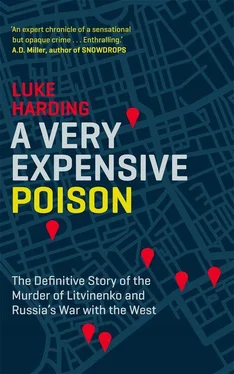Berezovsky was Jewish, clever, unscrupulous, self-promoting, ambitious, solipsistic, chameleon-like – a whirlwind of restless energy and speech. Asked years later what the appeal was of being with Berezovsky, Litvinenko’s friend Alex Goldfarb – who worked for him – answered simply: ‘It was fun.’
This was a moment in which Yeltsin, his poll ratings dismal ahead of Russia’s 1996 presidential election, made a deal with a small group of businessmen. These were the oligarchs. They agreed to get Yeltsin re-elected. In return the president, in effect, sold them Russian state assets at crazily low prices. Berezovsky acquired an interest in a major oil firm, Sibneft, together with a young oil trader called Roman Abramovich.
As Berezovsky told it, his rise to power and influence made him enemies. Especially inside the former KGB. Russia’s spy agencies were on the back foot following the KGB’s failed coup in August 1991 against Mikhail Gorbachev. Berezovsky said he urged Yeltsin to rein in the new FSB, and to debar former KGB operatives from high office. Russia needed to go through the same ‘lustration’ process that east Germany and the new Czech Republic went through after the fall of communism, he said.
The FSB, however, had plans of its own. Its goal was to regain the KGB’s lost supremacy. As Berezovsky later put it to British detectives: ‘KGB never disappeared. They were shocked because of [democratic] revolution in Russia. Step by step they start[ed] to understand what happened and to get back control.’ Yeltsin, he said, did ‘strong damage’ to them, but ‘nevertheless they were trying all the time to organise’. The FSB ‘didn’t like’ him, he said.
Berezovsky’s nerve centre was the LogoVAZ Club, a hunting lodge in the centre of Moscow. In 1994, Berezovsky left this office, climbed into the back of his Mercedes, and sped off. A car bomb exploded, killing his driver and severely injuring his bodyguard. Berezovsky survived and spent two weeks in Switzerland recuperating. The FSB used this attempted assassination as an excuse to dispatch Litvinenko to investigate Berezovsky and keep an eye on his affairs.
This was the beginning of a relationship that would define Litvinenko’s life. In March 1995, a gunman shot dead Vladimir Listyev, Russia’s most popular TV anchor, in the stairwell of his Moscow apartment. Listyev was the head of ORT, Russia’s first channel. Suspicion fell on Berezovsky, who had just taken over ORT together with a Georgian billionaire, Badri Patarkatsishvili. Berezovsky denied involvement; we don’t know who was responsible but it would certainly have been unlike him to use those methods. He flew back to Moscow from London.
When Moscow police came to arrest Berezovsky, Litvinenko went to the scene. He realised that in custody Berezovsky’s life was at risk: it was not unknown for the authorities to cause ‘accidents’ to happen behind closed doors. What happened next, Berezovsky told Scotland Yard, was ‘very unusual’: ‘He [Litvinenko] took his gun and said [to the police] if you try and catch him now I’ll kill you.’ Litvinenko called the head of the FSB, who agreed to give an order to protect Berezovsky. The police retreated and left.
At the time, Berezovsky scarcely knew Litvinenko, the good Samaritan. Afterwards, he said, they became ‘very close’. Marina Litvinenko said: ‘Boris said many times Sasha [Alexander] saved his life, and he was very grateful.’ Litvinenko was still working for the FSB but from then on became an informal part of Berezovsky’s entourage.
Meanwhile, Litvinenko was growing disenchanted with the leadership of his own organisation. The FSB was riddled with corruption, he learned. In 1997, he was posted to the FSB’s directorate for the investigation and prevention of organised crime, a covert unit known by the initials URPO. ‘It was the most secret department. It was FSB within FSB,’ Litvinenko said. His boss was Major General Evgeny Khokholkov. Unbeknown to General Khokholkov, Litvinenko had investigated him before. And been horrified at what he found.
Back in 1993, Litvinenko had investigated a group of bent FSB officers. He discovered that the officers – all members of the Uzbek KGB, transferred to Moscow – were taking bribes from an oil trader. The officers reported to Khokholkov. Khokholkov was also receiving protection money from Central Asian drug lords. Heroin was travelling from northern Afghanistan to Europe via Russia, with Khokholkov allegedly taking a cut.
The URPO special operations unit had its own secret office, away from the FSB’s headquarters in the Lubyanka building in central Moscow. URPO had been set up to perform ‘special tasks’ – including, if necessary, extra-judicial murder. Litvinenko, to his growing dismay, soon found himself expected to carry out unlawful activities as part of his new assignment. He received orders to detain and beat up a former FSB officer turned whistleblower called Mikhail Trepashkin. He was also instructed to kidnap a rich Moscow-based Chechen businessman, Umar Jabrailov. If necessary, Litvinenko was told to shoot Jabrailov’s police bodyguards. Litvinenko refused to obey.
But it was another order from a senior colleague that would provoke a political scandal and Litvinenko’s dismissal from the FSB. Yeltsin had appointed Berezovsky deputy head of the security council. Berezovsky helped to negotiate a peace deal with the Chechen rebels. Hardliners viewed this agreement as treachery – and Berezovsky as its perfidious architect.
One day, Litvinenko’s superior Alexander Kamishnikov came up to him. According to Litvinenko, he began by saying: ‘Look, we must be a true successor to the KGB, we must have continuity and you must defend the Motherland, you must discharge your duties properly. We have fallen on hard times, difficult times, and we must be firm and strong.’
Litvinenko was uncertain what to make of this speech. Kamishnikov, however, then continued: ‘Litvinenko, you know Berezvosky well, you must kill him.’
Litvinenko later told UK Home Office officials: ‘I could hardly believe what he had said and asked him if he was serious. He moved closer and repeated: “You must kill Berezovsky. Russia has fallen on hard times and there are people who are very rich who have robbed our Motherland; they have corrupted authorities and they are buying everyone in authority.”’ Kamishnikov said that a legal route would, of course, be preferable but in order to save the country it was necessary for Berezovsky ‘to be destroyed’.
According to Marina Litvinenko, the conversation left her husband ‘unhappy and nervous’ for two months. In the best traditions of Soviet conspiracy, the order wasn’t written down. Nonetheless, it was an order – one that Litvinenko viewed as tantamount to illegal terrorist activity.
Litvinenko tried to figure out what to do. It was New Year, and Berezovsky had gone to Switzerland for treatment after tumbling off his snowmobile. In March 1998, he finally tracked Berezovsky down to his dacha and told him about the conversation. Berezovsky refused to believe him. Litvinenko returned with several of his URPO colleagues – Andrei Ponkin, Konstantin Latyshonok and German Shcheglov. They persuaded Berezovsky the murder plot was genuine. Shocked, Berezovsky took the evidence to the deputy chief of Yeltsin’s private office.
Litvinenko’s action triggered turmoil inside Russia’s power structures. The FSB ran its own ‘investigation’, carried out by the same people who had apparently ordered Berezovsky’s liquidation. Privately, Khokholkov and Kamishnikov were furious. They wanted revenge. In April 1998, meanwhile, together with two URPO colleagues, Litvinenko recorded a video statement filmed at Berezovsky’s Moscow office. It was for use in case he was jailed. Or worse, killed. They made a deposition to the military prosecutor.
Читать дальше












